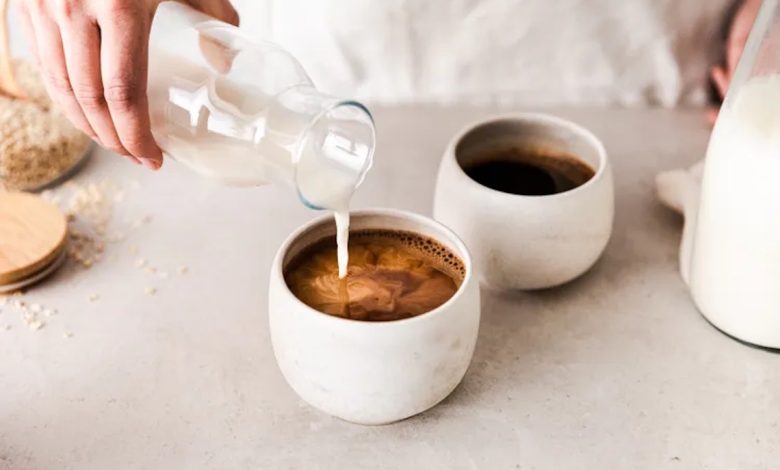9 Ways You’re Making Your Coffee Unhealthy Without Realizing It

healthy coffee: With all the flavor, sweetener, and additive options today, going overboard with less healthy coffee creations can be easy. If you don’t enjoy black coffee, you can find other ways to make your coffee order healthier without sacrificing flavor.
1. Overloading on Unhealthy Creamers
While cream can enhance flavor, add sweetness, and cool down a hot cup of coffee, not all creamers have the same benefits. Depending on the type (and amount) of cream you choose, you may be making your coffee less healthy.
For instance, just 2 tablespoons of vanilla-flavored creamer can add another 60 calories, 2 grams of fat, and 10 grams of sugar to your drink.
A healthier option would be adding a splash or two of plain, unsweetened soy or oat milk, which still provides a creaminess without the excess fat and sugar.
2. Overusing Sugar and Artificial Sweeteners
There are endless options to enhance coffee’s flavor and sweetness. While adding ingredients to coffee may boost flavor, it is also easy to overload with added sugar and potentially unwanted calories.
For example, 2 tablespoons of popular vanilla syrup can provide 80 calories and 20 grams of added sugar.3 Instead, cut your usual sweetener in half and add some ground cinnamon for flavor.
3. Choosing Low-Quality or Nonorganic Coffee
Not all coffees are of equal quality. Many lower-quality, conventionally grown coffee beans are treated with synthetic pesticides and chemicals that may linger in your cup. Consuming these substances over time may contribute to health concerns.
Consider choosing higher-quality, organically grown coffee labeled “USDA Organic” and ethically sourced coffee beans.
4. Drinking Too Much Caffeine and at the Wrong Times
healthy coffee, Caffeine is a natural stimulant designed to increase alertness and focus and temporarily boost energy. However, if you’re an all-day coffee drinker, you might notice its lingering effects on your mental health and sleep pattern.
Depending on how caffeine-sensitive you are, drinking a lot of coffee can promote jitteriness and increased feelings of anxiousness or stress. Some people find that drinking it on an empty stomach, such as before breakfast, can also lead to digestive upset or acid reflux.
Furthermore, caffeine can stay in your system for up to six to 14 hours after you stop drinking it.5 If you drink coffee in the afternoon and have trouble falling asleep at bedtime, your afternoon beverage may be to blame
If you think your coffee routine is triggering adverse effects, consider pairing it with a meal and not drinking it in the afternoon.
5. Skipping Natural Flavor Enhancers
If you rely solely on sweeteners and flavored creamers to improve your coffee’s flavor, you’re missing out on a world of natural, health-boosting flavor options. Simple kitchen ingredients like cinnamon, nutmeg, cacao powder, or a touch of vanilla extract can add depth and warmth to your cup without added sugars or artificial ingredients.
These natural enhancers provide unique flavors and can offer added antioxidants and anti-inflammatory benefits.6 Don’t underestimate the power of a spice rack when making your coffee both tasty and nutritious.
6. Skipping Healthy Add-Ins
Your morning coffee can be more than a pick-me-up. It’s another opportunity to incorporate healthy ingredients into your day.
For instance, coffee can be a vehicle for functional mushroom powders or cacao that you might not otherwise know what to do with. Some people like adding collagen peptides to their coffee as a simple way to support skin health and exercise recovery.
7. Relying on Store-Bought Coffee
Packaged or made-to-order coffee drinks from chains are convenient, but they tend to be full of ingredients that contribute extra calories, unhealthy fats, and added sugar from syrups and flavoring agents. Sometimes, a large specialty coffee drink can contribute more calories than a meal.
healthy coffee, These drinks are a great occasional treat, but if you drink them regularly, they can quickly sabotage your health goals. Making coffee at home gives you control over what goes into your cup.

8. Forgetting to Stay Hydrated
While there’s a widespread perception that coffee dehydrates, that’s not necessarily true. Caffeine is a diuretic that encourages fluid loss, meaning it makes you pee more often, but coffee is mostly water and isn’t directly dehydrating.
However, you should not rely on coffee as your primary source of hydration. Water is essential to your overall health and supports many basic bodily functions.
9. Using Plastic Coffee Makers or Pods
Brewing coffee in plastic machines or using single-use pods is convenient, but it could come with hidden health risks. When exposed to hot water, certain plastics can leach chemicals like bisphenol A (BPA) or phthalates into coffee with repeated use.
These compounds have been linked to hormone disruption and other health concerns. Consider switching to coffee makers made from stainless steel, glass, or ceramic for a healthier and lower-risk brew. Not only is this better for your body, but it’s also a more sustainable choice for the planet.
Is Hot vs. Iced Coffee Healthier?
Hot and iced coffee are evenly matched if you’re mindful of what you add to them. The main difference lies in how they’re brewed.
Iced coffee drinks (like cold brew) tend to be lower in acidity and may be gentler on sensitive stomachs. Some research suggests that hot coffee may have a higher antioxidant content due to greater extraction of bioactive compounds in the hot beverage.
Healthy Coffee Alternatives
healthy coffee, There are plenty of healthy alternatives if you’re trying to cut back on coffee. Here are some to consider:
Green tea: Green tea contains less caffeine than coffee per serving. It’s high in antioxidants like epigallocatechin gallate (EGCG), which supports brain and heart health and may even have anticancer properties.
Matcha: Matcha is a powdered form of green tea with a smooth, earthy flavor and a more sustained energy release thanks to L-theanine, an amino acid. The combination of L-theanine and caffeine promotes focus and efficiency.
Herbal coffee blends: These unique blends are made from ingredients like chicory root, dandelion, and carob. They often have an earthy flavor, are caffeine-free, and may offer anti-inflammatory and gut-friendly benefits.
Functional mushroom beverages: These drinks are made with mushrooms like lion’s mane, chaga, or reishi and may help support brain function, immunity, and resilience to stress.
Golden milk: Also called a turmeric latte, this is a warming blend of anti-inflammatory turmeric, spices, and milk (or plant milk). Turmeric contains the active compound curcumin, which is responsible for many of its health benefits. To boost curcumin absorption, add a dash of black pepper.
Yerba mate: Also called Paraguay tea, this is a South American tea with natural caffeine and a robust flavor. Some people like that it provides a balanced energy boost without the jitters of coffee.
Chai tea: Chai is a spiced black tea offering caffeine and spices like cinnamon and ginger that support digestion and circulation.
Also Read:
Best Vitamins for Fighting Inflammation
7 healthy breakfast ideas for a happy gut
Morning or evening: What’s the best time of the day to drink chia seed water?




